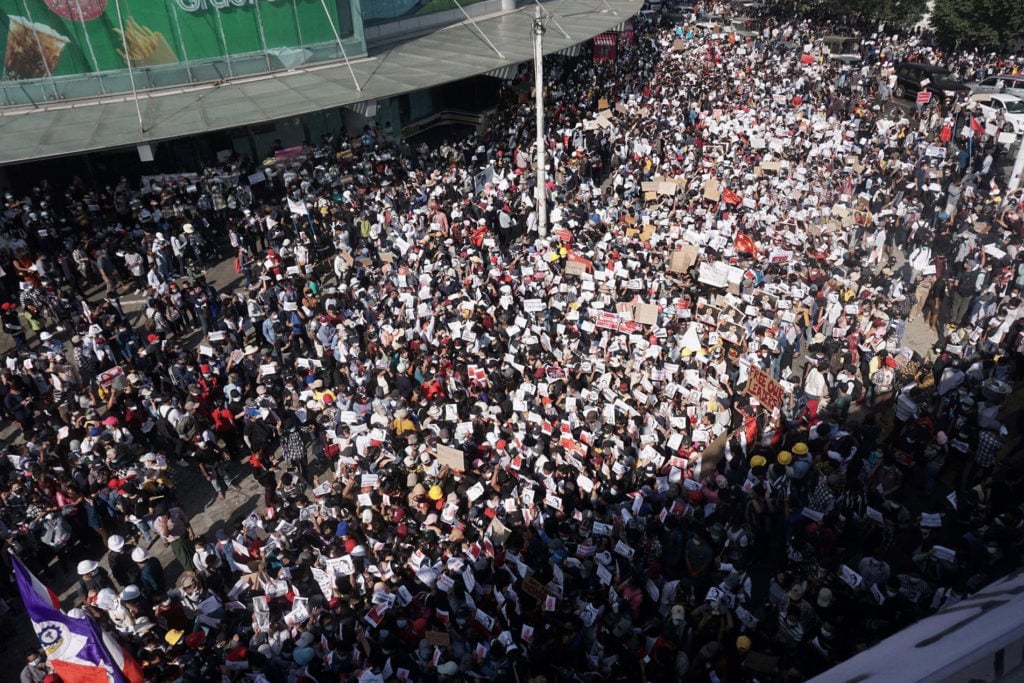Civil Disobedience: Implications for Myanmar
PUBLISHED: MARCH 2021
Myanmar’s growing civil disobedience movement has garnered global attention for its use of non-violent tactics to oppose the military’s February 2021 coup. Regardless of whether civil disobedience actions are considered unlawful under national law, many peaceful acts of civil resistance are protected under the international law of peaceful assembly, and expression. Any response to the civil disobedience movement in Myanmar must be proportionate and fully compliant with international legal standards.
What is Civil Disobedience?
“Civil disobedience” has been defined as “a public, nonviolent, conscientious yet political act contrary to law usually done with the aim of bringing about a change in the law or policies of the government.” It has played a prominent role in movements worldwide, from abolitionists and suffragettes to actions of Mahatma Gandhi, Martin Luther King, Nelson Mandela, and Desmond Tutu protesting discrimination and human rights violations.
Acts of civil disobedience can range from protesters blocking traffic, to ‘sit-ins’ or ‘walk-outs,’ and product or service boycotts. There is often significant overlap between civil disobedience, assemblies, and strikes. Although support for rule of law is paramount in democratic societies, not all laws are just or ethical, such as laws institutionalizing slavery or racial segregation. Laws and policies are more likely to be unfair when the democratic process has been thwarted; civil disobedience can then be an effective advocacy tool to pressure authorities and build support for fairer policymaking.
Myanmar’s Civil Disobedience Movement
In the wake of the February 2021 military coup in Myanmar, a civil disobedience movement has taken root, alongside mass protests and opposition from much of the civilian population. A Facebook group called the “Civil Disobedience Movement” has attracted over 330,000 followers since it launched in early February. The movement has called for boycotting products and services linked to the military, coordinated nightly striking of pots and pans in symbolic protest, large-scale assemblies, and mass “car breakdowns” or “slow-motion drive protests” on city streets. There have also been widespread labor strikes, with walkouts by frontline medical workers, civil servants, miners, educators, railway workers, bank staff, and journalists.
Legal Implications and Relevant International Standards
Myanmar’s military has responded to mass opposition in several ways, including imposing martial law, nightly curfews, shutting down the internet and telecommunications, arresting hundreds of activists and defenders, revoking fundamental privacy and security protections, and introducing restrictive cyber laws. They have also used violent force against peaceful protesters, resulting in scores of deaths and injuries.
Many of these actions are clearly illegal under international law. Conversely, many actions carried of the Myanmar civil disobedience movement – including peaceful strikes, protests, and boycotts – are not only permitted under international law, but protected under the rights to peaceful assembly, free expression, and association. This is true even where such actions may violate domestic law – especially given that many of Myanmar’s laws themselves are not in compliance with international law.
There are several relevant international norms that apply to the situation in Myanmar:
THE THREE-PART TEST
Under international law, any government-imposed limitations on assembly, expression, or association must pass a stringent three-part test showing their conformity with the law, appropriate purpose, necessity and minimal restrictive nature. Decrees and edicts imposed by a military junta that has enforced a coup against a democratically elected government – additionally violating the right of self-determination – are unlikely to pass this test.
THE UNIVERSAL DECLARATION OF HUMAN RIGHTS
The Declaration states that “it is essential, if man is not to be compelled to have recourse, as a last resort, to rebellion against tyranny and oppression, that human rights should be protected by the rule of law.” Scholars have recognized this and similar language in other treaties as establishing “at a minimum, a legal privilege for individuals to act in a nonviolent, proportionate fashion to protest and to attempt to prevent a regime’s continued violation of international human rights.”
THE NUREMBERG PRECEDENT
The Nuremberg precedent also helps to legally justify civil disobedience internationally, based on the idea that obeying orders is not a defense to an accusation of having committed an international crime; this principle theoretically creates an obligation to disobey certain immoral, unjust orders, or those that would violate international human rights law.
ICCPR GENERAL COMMENT 37
The recent General Comment No. 37 (2020) on the right of peaceful assembly issued by the Human Rights Committee of the ICCPR explicitly extends the right of peaceful assembly to include non-violent “collective civil disobedience or direct action campaigns.” The OSCE and the Council of Europe, through the Venice Commission, have further confirmed that the State’s response in cases of civil disobedience must be proportionate, and cognizant of the actions’ expressive intent. Although Myanmar has not yet ratified the ICCPR, it has acceded to multiple other international treaties that protect free assembly, association, and expression rights, and is bound to protect these rights and abide by relevant international law.
Conclusion
The civil disobedience movement in Myanmar remains a predominantly peaceful expression of the popular will, consistent with current and past movements opposing oppressive laws and policies. Any responses by authorities to such actions must be measured, proportionate, and in line with international law.
